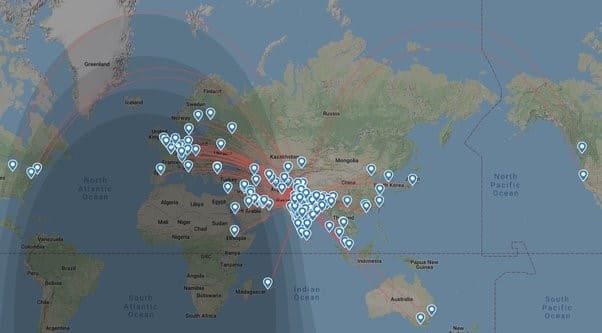
In the early hours on June 13, Israel launched airstrikes targeting locations in Iran, prompting the immediate closure of Iranian airspace. Along with Iran, Iraq and Jordan have also shut their airspace entirely as a precaution, grounding flights and disrupting key east-west flight corridors. As a result, airlines in Europe and Asia have begun rerouting their operations between the two regions, facing a further narrowing of Asia-Europe flight options and raising operating costs.
Israel has also suspended all commercial flights and closed its airspace following recent military strikes and security alerts. EL AL Israel Airlines has halted all inbound and outbound services, and Ben Gurion Airport in Tel Aviv remains closed until further notice.
Air India on June 13 issued a travel advisory following the closure of airspaces in Iran, Iraq, Israel and Jordan, announcing that multiple long-haul flights are either being diverted or returning to their point of origin, in response to escalating regional tensions between Israel and Iran.
This development is particularly significant for Indian carriers, as Pakistani airspace is already closed to them. The situation is further exacerbated by the recent tragic incident in Ahmedabad, where an Air India flight bound for London crashed during takeoff.
Air India and IndiGo are among the airlines that are expected to opt for longer paths for their flights to Europe and surrounding parts of Asia, as was the case last year in October 2024 when tensions between Iran and Israel had forced airlines to take longer routes.
But in the current scenario with the Pakistani airspace also remaining closed, Indian carriers are expected to face even more uncertainties.
What alternative routes can Indian airlines take now to fly to Europe and North America?
 Impact of Pakistani airspace closure on Indian airlines
Impact of Pakistani airspace closure on Indian airlines
The rerouting around Iranian airspace had added up to an hour for flights between India and Europe and around two hours for flights between India and North America back in 2024, but the use of the Pakistani airspace was crucial at the time.
Indian carriers have been barred from entering Pakistani airspace since April 24, initially for a month, and the restriction was later extended via a NOTAM (Notice to Airmen) until June 24. This prohibition applies to all Indian airlines.
With the Pakistani airspace remaining closed till at least June 24, Indian flights to Europe and North America will have to either detour around Oman, UAE, Saudi Arabia and Egypt or would have to take a circuitous route over the Hindu Kush mountains, China, Tajikistan, Central Asia, the Caspian Sea and the Caucasus region before entering European airspace.
"Last year Air India was flying all its Europe and UK-bound flights over countries like Tajikistan, Uzbekistan and Turkmenistan, while avoiding Iranian airspace altogether. This year that will be difficult due to the Pakistani airspace restriction unless the aircraft fly over the Hindu Kush mountains and into China, which will require more fuel and passenger safety features," Lokesh Sharma, a senior aviation and defence expert, told Moneycontrol.
Both routes are expected to add significant additional flying time, with flights to Europe expected to be extended by two to three hours, while those to the US face an additional flying time of four to six hours and a refuelling stopover. The higher bill on account of higher fuel usage is likely to lead to more expensive tickets.
Fuel costs, a significant operational expense for airlines, are also expected to rise if crude oil prices surge in response to the escalating conflict. With airlines already stretched thin by the post-pandemic recovery, this surge threatens to disrupt travel affordability, particularly during the upcoming holiday season.
"The impact of fuel prices will unfortunately be passed on to customers if the price escalation for crude is beyond a level that the airline can sustain. There is a growing fear that air travel between Europe and the Middle East may be severely impacted if ongoing conflicts continue to escalate. We expect at least a 10-20 percent rise in airfares over the next month as passengers look to book their festival season plans in advance," a senior executive from a domestic carrier told Moneycontrol.
Wider global disruptions
International carriers including Emirates, Etihad, Qatar Airways, British Airways, Lufthansa and flydubai have also diverted or cancelled flights that typically transit through Iranian or Iraqi airspace. Routes between Europe and the Gulf, and between Asia and North America, are especially affected. Some flights are being rerouted via Central Asia or the Mediterranean, adding hours to journey times.
Iraq early on June 13 closed its airspace and suspended all traffic at its airports, Iraqi state media reported. Eastern Iraq near the border with Iran has one of the world’s busiest air corridors, with dozens of flights crossing between Europe and the Gulf, many on routes from Asia to Europe, at any given moment.
Flights were being steadily diverted over Central Asia or Saudi Arabia, flight tracking data showed.
“The situation is still emerging—operators should use a high degree of caution in the region at this time,” said a statement from Safe Airspace, a website run by OPSGROUP, a membership-based organisation that shares flight risk information.
Though it's too early to gauge the full impact on airfares, industry experts predict a significant rise in ticket prices in the near term. As travellers gear up for the busy Christmas and New Year season, airlines are preparing for a challenging period of rerouted flights, delayed travel and higher ticket prices.
Discover the latest Business News, Sensex, and Nifty updates. Obtain Personal Finance insights, tax queries, and expert opinions on Moneycontrol or download the Moneycontrol App to stay updated!